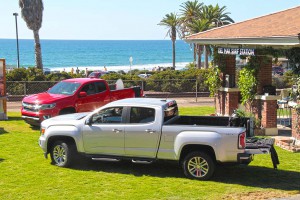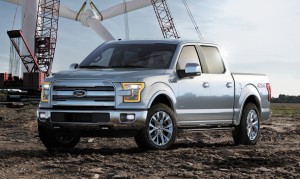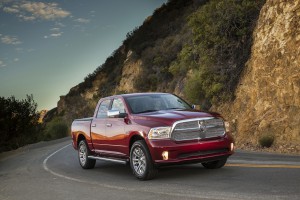It’s that time of year, nominees for all sort of automotive awards being revealed in time for the launch of the 2015 models. But where performance and luxury features might sway most juries, at least one major award focuses on things environmental.
So, it might come as a surprise to see Green Car Journal tipping its hat to five new pickups, but the magazine says vehicles like the Ram 1500 EcoDiesel and Chevrolet Colorado underscore the dramatic changes sweeping through all aspects of today’s automotive world.
“The significant efficiency and environmental improvements being made in the truck segment signal an important change in the industry,” said Ron Cogan, publisher of the Green Car Journal and CarsOfChange.com.
Along with the diesel version of Chrysler’s big Ram pickup, the five nominees include General Motors two new midsize pickups, the Colorado and the GMC Canyon, both boasting segment-leading fuel economy. Ram has a second nominee in the form of the 1500 HFE. Meanwhile, Ford rounds out the quintet with its new aluminum-bodied F-150.
The “aluminum-intensive” pickup has been the subject of intense scrutiny from analysts and investors to potential buyers. The switch from conventional steel will shave as much as 700 pounds off some versions of the full-size F-150 pickup, and is expected to yield significant fuel economy improvements. But there are questions about durability and repairs, and several analysts have issued warnings that Ford earnings could suffer due to a slower than expected production ramp-up.
(Click Here for our review of the new 2015 Chevrolet Colorado and GMC Canyon trucks.)
Nonetheless, the shift to aluminum could accelerate the pace of the industry’s so-called “lightweighting” in the face of stiff new Corporate Average Fuel Economy standards going into effect in 2016 and then in 2025. Some forecasts predict Ford’s competitors will have to make a similar move in the coming years.
Chrysler is taking a different approach with its various high-mileage Ram powertrains, particularly with the EcoDiesel, the first light-duty full-size pickup to offer an “oil-burner” option in years.
(Chrysler doubling output of new Ram 1500 EcoDiesel. Click Here for more.)
GM plans to introduce a diesel for its new midsize trucks in 2016, as well. But it has already struck an apparently resonant chord with buyers who want something a little more efficient and maneuverable than full-size trucks. Like Detroit rivals Ford and Chrysler, GM seemed to be abandoning the declining midsize segment several years ago, but came back with completely new designs.
That has competitors, both foreign and domestic rethinking the potential of the midsize market. Ford originally ruled out a U.S. version of its new global Ranger midsize truck, but is now hinting it might come back with a smaller, less expensive alternative. Honda was ready to walk away from its Ridgeline but is now developing a replacement. And both Nissan and Toyota are set to update their midsize models, the Frontier and Tacoma, respectively.
(For more on Ford’s possible change of heart, Click Here.)
“These five finalists show that environmental improvement in the truck world is changing in a very big way,” said Green Car’s Cogan.
The winners of the Green Truck of the Year will be announced on November 6th during a ceremony in San Antonio. The magazine will separately reveal its Green Car of the Year during a ceremony at the Los Angeles Motor Show next month.




For the past 10+ years I have said that U.S. light duty pick-up trucks and SUVs should be offered with a proper sized, reliable clean Diesel engine. Unfortunately truck/SUV makers have been hesitant due to the outrageous U.S. Diesel emissions requirements which are more stringent than any country in the world (to promote unrealistic EV sales), and due to the bad experience many consumers remember from the 80’s when U.S. car makers tried to convert gas engines for Diesel use and failed miserably – enraging consumers who paid a premium for these poorly engineered models rushed to market.
VW and Mercedes don’t seem to have any problem meeting these “outrageous” U.S. Diesel emissions requirements you speak of. If GM, Ford, and Chrysler are dragging their feet on Diesels, it’s most likely because they either haven’t invested in the necessary R&D (hard to believe in Ford’s case) or, more likely, they don’t want to spend the money to introduce them. In GM’s case, they’re probably afraid to because of the inevitable recall hell that would surely ensue.
Actually VW,BMW and Mercedes charge dearly for the “U.S. spec only” emissions requirement. The reason the requirements are “outrageous” is because they are the most stringent in the world, even tougher than in Germany which is a very “green” country. Obama and the EPA created these “outrageous” clean Diesel emissions requirements to discourage clean Diesel sales in the U.S. and promote impractical EVs.